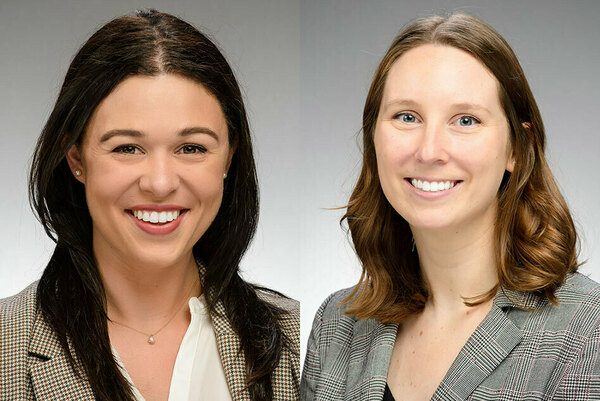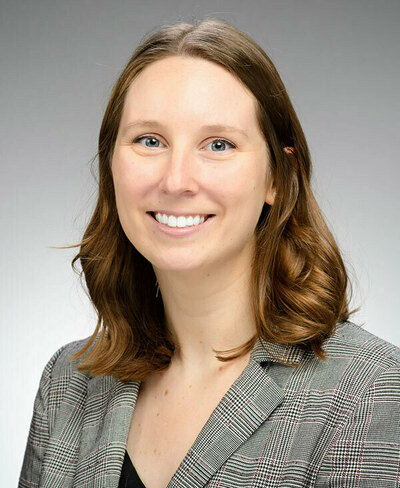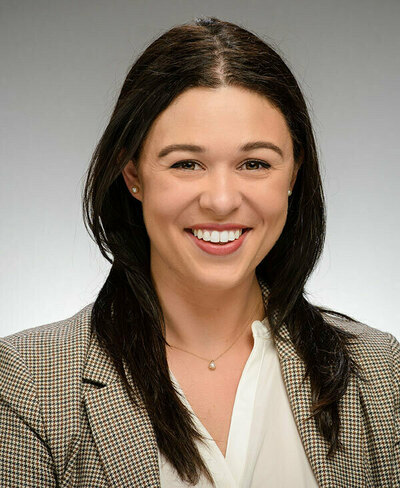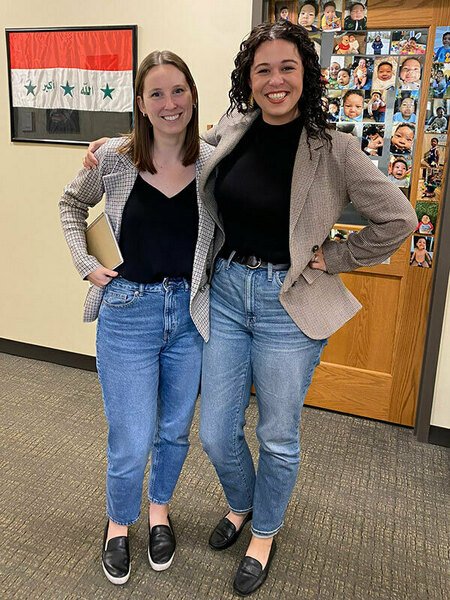

As political scientists, Rachel Porter and Erin Rossiter know the importance of being fluent in several languages.
Porter understands R (a programming language for statistical analysis and data visualization), Stata (statistical software used for data manipulation, visualization, statistics, and automated reporting), and Python (a high-level, general-purpose programming language).
Rossiter is multilingual, too. She’s adept in R, Python, C++ (a programming and coding language), SQL (a programming language to manage relational databases), and Java (a high-level, class-based, object-oriented programming language).
“Our methodological skills and tools and experience mesh,” Rossiter said. “We make a powerful team. It’s exciting.”
 Rachel Porter
Rachel PorterTheir tech skills make the assistant professors of political science two of the top young quantitative data scientists in political science today, said Geoff Layman, chair of the Department of Political Science. They greatly improve and expand the research opportunities and course offerings for graduate and undergraduate students.
“Having these superb young women on our faculty is a real feather in the cap of the department,” he said. “They are extremely talented, energetic, and creative scholars, and each was the best political methodologist on the job market in the year we hired them.”
Prepared for change
Rossiter, who joined the faculty in 2021, researches how conversations about hot-button issues between Republicans and Democrats affect polarization. And Porter, who began this year, studies Congress, candidates, and elections.
Evolving tools and methodologies allow Rossiter and Porter to relatively quickly gather, distill, and analyze information, discuss findings with others down the hall and across the globe, and communicate findings about dynamics and trends.
In the process, they’re able to reassess, revise, and reinvent long-held theories in the discipline.
“Technology keeps growing and the tools at our disposal keep getting better and more sophisticated,” said Porter, who also is a faculty affiliate with the Lucy Family Institute for Data and Society. “If you want to keep at the forefront of the field, you need to keep growing, as well.”
Rossiter enjoys designing experiments, including when they involve interventions for the social good — such as studying whether conversations reduce political polarization. She taught a graduate course in experimental design, and she and Porter also teach or will teach never-before-offered classes on programming, big data, text as data, and quantitative political analysis.
“Notre Dame brings in the best and brightest students and we want to help make them even better and brighter,” Porter said. “We want them to have these new methods in their quantitative toolbox, together with the amazing qualitative and substantive knowledge they have about politics that they learn from the breadth of this faculty. We want them to be even more prepared to take on the world, get the best jobs, and be the most prepared to change things.”
“We want (Notre Dame students) to be even more prepared to take on the world, get the best jobs, and be the most prepared to change things.”
Challenging negative stereotypes
Rossiter’s fascination with politics began in Iowa in 2008, when she attended presidential candidate rallies with her mom in advance of the state’s caucuses — and Barack Obama campaigned in her middle school gym.
She elected to study politics and English at Creighton University, then during graduate school at Washington University in St. Louis taught herself experimental design techniques for her doctoral dissertation, “The Consequences of Interparty Conversation on Outparty Affect and Stereotypes.”

For that research, which won the Timothy E. Cook Best Graduate Student Paper Award from the American Political Science Association’s Political Communication Section, she designed an experiment that paired Democrat and Republican voters to talk one-on-one. Some discussed divisive political topics (including gun control and migration), and others addressed nonpolitical issues.
Talking, she found, improved how the two sides felt and thought about each other, whether the conversations were political in nature or not. Participants used fewer negative words such as “mean” and “close-minded,” and more positive adjectives, such as “honest” and “intelligent,” to describe their conversation partners.
“It’s contrary to what a lot of people would expect,” Rossiter said.
She wondered, though, whether that would hold true after the insurrection at the U.S. Capitol on Jan. 6, 2021. So she designed a similar experiment that had Republicans who voted for Donald Trump correspond online about the election outcome with Democrats who voted for President Joe Biden.
Even though circumstances could have pushed them “deep into their partisan corners,” Rossiter said, participants still came away feeling warmer toward each other.
“This showed that if we engage in a conversation with someone in another party, just once, maybe it can have a domino effect,” she said. “Maybe things can change.”
Over the past year, Notre Dame undergraduates funded by the Rooney Center for the Study of Democracy have been hand-coding each conversation in the study so that Rossiter can analyze why that happened.
She hopes the findings encourage people to communicate with folks with different political stripes rather than ascribe negative traits to them.
“That’s how we learn,” she said.
No experience required
Porter, who grew up in Toronto, Canada, first engaged with U.S. politics when she took a summer course on the presidency at the University of Georgia — because it was the only class that had an open slot.
Her professor was impressed by her insightful questions and recruited her to conduct research. She was hooked, switching her major from art history to political science and international affairs, then interning for a member of Congress in Washington, D.C.
She’s still interested in Congress, including studying diversification trends in the overwhelmingly white, older, and male institution. She analyzes who runs for office, who donates to candidates, who gets elected, and how they perform.
She’s also writing a book (and published a piece on Vox) analyzing the recent trend of political newcomers defeating experienced politicians — in 2016, for example, an inexperienced candidate won 60 percent of Republican primaries for open seats.
While newcomers give Congress fresh outlooks and more diversity, Porter said, because many haven’t served politically before, they don’t have connections, aren’t familiar with processes, and have a steep learning curve to overcome.
“Is this a bad or good thing, or both?” said Porter, who earned her doctorate from the University of North Carolina at Chapel Hill. “It’s to be determined.”
Porter has also discovered new patterns in how congressional campaigns are financed. In a Legislative Studies Quarterly article, she showed that from 2016 to 2020, political newcomers who secured early contributions from outside their respective districts had greater success in subsequent fundraising and an increased likelihood of winning the primary.
This contrasts with prior elections, when early money from a candidate’s congressional district was the strongest predictor for future fundraising and electoral success.
Decades ago, accessing such data would have required sending letters to the Federal Election Commission, and receiving it back on a floppy disk. Now, when Porter makes targeted queries to the right sources, all the pertinent information is at her fingertips — and then she uses her programming ability to draw conclusions from it.
“I need to understand data structure and data storage and ask the right questions of the interface or the base code to get the data that I need to do work I want to do,” she said.
“This department, and the University generally, is so supportive of junior scholars and of intellectual freedom, intellectual curiosity and intellectual nurturing.”
Teaming up
This spring, Porter and Rossiter plan to make a joint presentation about partisan discourse among elites at the Rooney Center’s Keeping the Republic Conference on campus, and are looking forward to the opportunities to learn from top scholars nationwide.
They also have both appreciated the goodwill of senior Notre Dame faculty, who have readily answered questions and provided guidance on research and teaching.
“This department, and the University generally, is so supportive of junior scholars and of intellectual freedom, intellectual curiosity and intellectual nurturing,” Porter said.
Starting their careers just down the hall from one another also has been fantastic, they said, since not many women conduct research in their field the way they do.
“It’s great for the department as a whole but it’s also great for each of us,” Porter said. “We have someone to talk to and rely on and bounce ideas off. It’s really special.”
Originally published by at al.nd.edu on November 02, 2022.